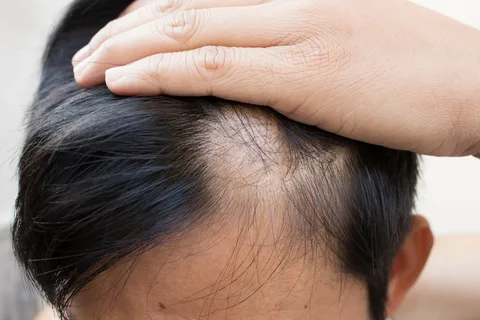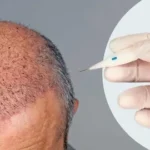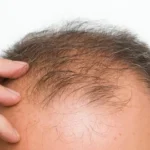Learn about frontal fibrosing alopecia, a scarring hair loss condition affecting the hairline and eyebrows. Discover expert diagnosis and treatment options with Dr. Uzma Irfan in Islamabad.
Are you noticing a slow receding hairline or eyebrow thinning and wondering if it’s more than normal aging? You may be dealing with frontal fibrosing alopecia (FFA)—a type of scarring alopecia that primarily affects women, especially after menopause.
At Dr Uzma Irfan Hair Transplant Clinic in Islamabad, patients receive individualized care for early diagnosis and long-term management of FFA. With Dr. Uzma Irfan’s internationally recognized expertise (ABHRS, ISHRS), you get medically guided options based on experience, evidence, and ethics.
What Is Frontal Fibrosing Alopecia?
Definition
Frontal fibrosing alopecia is a type of primary cicatricial (scarring) alopecia that causes permanent damage to the hair follicles. It leads to a slowly progressive recession of the frontal hairline, often accompanied by eyebrow loss, and sometimes even loss of body or facial hair.
Unlike non-scarring hair loss, the follicles are replaced by scar tissue, which means the hair does not grow back once it’s lost.
Common Symptoms and Signs of FFA
Early Indicators
- Gradual recession of the frontal hairline, often with symmetry
- Eyebrow thinning or complete loss, often an early warning sign
- Itching, burning, or discomfort on the scalp
- Red or inflamed skin along the hairline
Progressive Symptoms
- Shiny, scarred scalp where hair has been lost
- Patchy hair loss extending to the temples or behind the ears
- Potential loss of body hair, including eyelashes, arms, or legs
What Causes Frontal Fibrosing Alopecia?
The Role of Autoimmunity and Hormones
While the exact cause remains unknown, researchers believe that FFA is an autoimmune condition. It occurs when the immune system mistakenly attacks the hair follicles.
Other potential contributing factors include:
- Hormonal changes, especially around menopause
- Genetic predisposition (family history of autoimmune diseases)
- Environmental triggers such as UV exposure or cosmetic products
Who Is at Risk?
Frontal fibrosing alopecia mostly affects:
- Women over the age of 45 (particularly postmenopausal)
- Individuals with autoimmune disorders
- People who frequently use certain sunscreens or anti-aging creams (based on emerging evidence)
How Is FFA Diagnosed?
At Dr Uzma Irfan Hair Transplant Clinic Islamabad, diagnosis typically involves:
- Clinical examination and medical history
- Dermoscopy to assess hair follicle inflammation and miniaturization
- Scalp biopsy in select cases to confirm scarring
Early diagnosis improves outcomes significantly by starting treatment before permanent follicle destruction.
Treatment Options for Frontal Fibrosing Alopecia
There is currently no cure for FFA, but with early intervention, progression can be slowed and symptoms managed.
Medical Management
- Topical corticosteroids to reduce inflammation
- Intralesional steroid injections for targeted control
- Oral anti-inflammatory drugs (e.g., hydroxychloroquine or doxycycline)
- 5-alpha reductase inhibitors (finasteride or dutasteride) to address hormonal components
- Topical calcineurin inhibitors as alternatives to steroids
Surgical Option: Hair Transplantation
Hair transplantation may be considered in patients with stable disease. However, due to the scarring nature of FFA, this must be approached cautiously and requires proper assessment by an experienced hair restoration surgeon.
Dr. Uzma Irfan evaluates candidates carefully to determine realistic expectations and the safest techniques, including follicular unit extraction (FUE).
Services Offered at Dr Uzma Irfan Hair Transplant Clinic Islamabad
- Diagnosis and medical treatment of frontal fibrosing alopecia
- Hair restoration procedures including FUE hair transplant
- Non-surgical options for early-stage patients
- Individualized care plans based on evidence-based protocols
Dr. Uzma Irfan holds certifications from ABHRS (American Board of Hair Restoration Surgery) and ISHRS (International Society of Hair Restoration Surgery), ensuring ethical, research-backed care.

Why Choose Our Clinic in Islamabad?
Local Expertise, Global Standards
- Convenient location in Islamabad, accessible for local and international patients
- Follow-up support for medical tourists
- Transparent guidance without unrealistic promises
We focus on medical integrity and patient education, providing clear information on outcomes, maintenance, and treatment limitations.
Book an appointment with doctor Uzma Irfan
If you’re concerned about a receding hairline, eyebrow loss, or other symptoms of FFA, early diagnosis is crucial.
📞 Book a private consultation with Dr. Uzma Irfan today
📱 Contact us via WhatsApp or Phone
📸 View our before-and-after gallery
📘 Explore our Hair Loss Treatment Guide
FAQs About Frontal Fibrosing Alopecia
Can frontal fibrosing alopecia be reversed?
FFA causes permanent follicle damage, so regrowth is unlikely in scarred areas. Treatment aims to halt progression and preserve existing hair.
Is FFA contagious or caused by poor hygiene?
No. FFA is not infectious and is not linked to hygiene. It is believed to be an autoimmune and/or hormonal condition.
Can men develop FFA?
Yes, although less common, men can also develop frontal fibrosing alopecia, often presenting with similar frontal recession and eyebrow loss.
In select, stable cases, FUE transplantation may be an option. An experienced surgeon like Dr. Uzma Irfan will assess candidacy and provide honest expectations.
Final Thoughts
Frontal fibrosing alopecia can be emotionally distressing, especially as it often affects visible areas like the hairline and eyebrows. While the condition is not reversible, early diagnosis and appropriate treatment can significantly slow its progression and preserve existing hair. Understanding your options—from medical therapies to advanced restoration techniques—can help you make informed, confident decisions about your hair health.
At Dr Uzma Irfan Hair Transplant Clinic in Islamabad, patients benefit from ethical, personalized care guided by global standards and medical expertise. Whether you’re local or traveling from abroad, you’re in trusted hands with Dr. Uzma Irfan, ABHRS-certified and dedicated to evidence-based hair restoration.
Follow us on Facebook, Instagram, and YouTube for expert insights and real patient stories.






